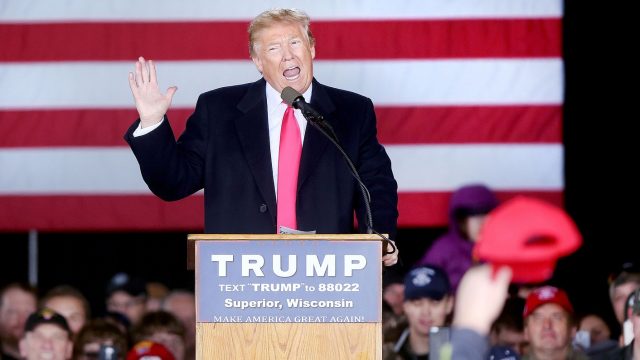John Andrist: There's A Political Revolution Taking Place

Republican presidential candidate Donald Trump speaks to the crowd in a hangar at the Richard I. Bong Airport in Superior, Wis., on Monday afternoon, April 4, 2016. Trump spoke for just under an hour and addressed his GOP opponents, foreign trade, NATO, immigration and jobs, among other topics. Bob King / rking@duluthnews.com
Raise your hand if you are sick of the total domination of presidential politics in our news media and every place else we look these days.
Raise your hand again if you would like to do something about it.
Well, you can’t, and I can’t, but I think I’ve made a beginning in understanding why.
There’s a political revolution taking place. The people (or at least the voters) are firing the political parties and taking over the business of choosing presidential nominees.
Traditionally, we have left the nominating process to our political parties. We reserved for ourselves only the right to make the final judgment on election day.
In effect we said, “You be the nominating committee; then let us decide.”
Most of us aren’t very interested in the nitty gritty of the business. Our legislative districts are drawn with about 15,000 residents in them.
It’s not a closed system. Anyone can be involved. But the reality is in most districts, only about 25 or 30 folks show up for the Republican and Democrat meetings.
About 20,000 North Dakotans care enough to travel to Republican and Democrat state conventions. That’s only a smidgen of us, about 3 percent, but enough so you no doubt know and are friends of some of them.
Today we are in the midst of a revolution, wherein huge numbers of us appear to be dissatisfied with the system.
So most states have set up primary elections, which bind the convention delegates to vote for those we prefer to be the candidates.
[mks_pullquote align=”right” width=”300″ size=”24″ bg_color=”#ffffff” txt_color=”#000000″]Although both parties tend to have either a conservative or liberal bias, collectively their goal has always been trying to build consensus around someone they believe can win. If they have one sin, it is they tend to stick with a perceived winner even when they know he is pretty bad.[/mks_pullquote]
That has upset the traditional party insiders, who have always focussed primarily on the business of electing candidates, not about ideology.
Although both parties tend to have either a conservative or liberal bias, collectively their goal has always been trying to build consensus around someone they believe can win.
If they have one sin, it is they tend to stick with a perceived winner even when they know he is pretty bad.
So the war today is the people vs. the political parties. Do we want to use a representative system to make candidate endorsements or do we want to do it ourselves?
When we weren’t directly involved in the nomination process the system didn’t generate all that political news that clutters the networks.
But now with a populist nominating process in states and a different primary election every couple weeks it’s like a super bowl game that’s 30 weeks long for the media.
This new system could become the new normal, and political parties could become obsolete if we like it better.
There will be little suspense or interest in presidential nomating conventions when we know how they have to vote.
North Dakota is one of the few states that has so far resisted the change, choosing not to have a presidential primary and to send delegates who are uninstructed or unbound..
It will be interesting to see if this evolution continues and becomes universal, or if the other states will end their primaries in favor of the old system.
Until then the media carnival will continue.
I’m betting on the Democrats
All these primary elections have taught us that the people (voters) are more polarized than those who represent them.
A majority of our country’s primary voters have cast primary ballots for either Bernie Sanders or Donald Trump, which the insiders of both parties consider too extreme to get elected.
Right now the odds seem to suggest Democrats may be able to settle on Hillary Clinton.
It’s pretty hard to guess what Republicans will do.
But the new system is suggesting that come November most of us will be voting against instead of for a new president.
Will this become the new norm if the presidential primary election system continues into the future?
And another question: if Americans are really so divided is there any hope that we can ever again have government by consensus?




